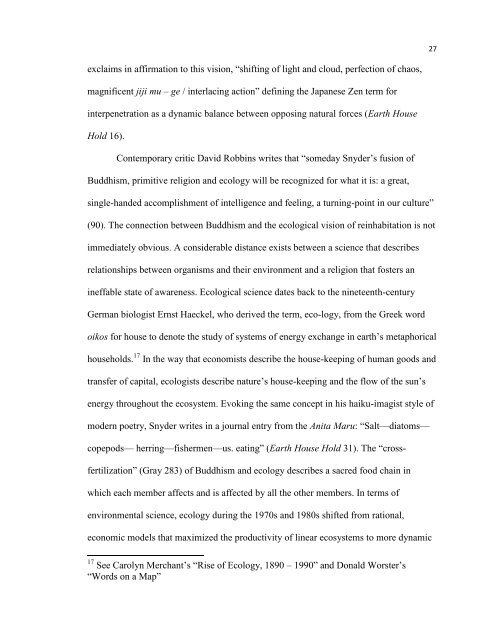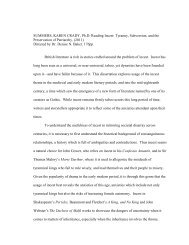RE-INHABITING THE ISLANDS - The University of North Carolina at ...
RE-INHABITING THE ISLANDS - The University of North Carolina at ...
RE-INHABITING THE ISLANDS - The University of North Carolina at ...
Create successful ePaper yourself
Turn your PDF publications into a flip-book with our unique Google optimized e-Paper software.
27<br />
exclaims in affirm<strong>at</strong>ion to this vision, ―shifting <strong>of</strong> light and cloud, perfection <strong>of</strong> chaos,<br />
magnificent jiji mu – ge / interlacing action‖ defining the Japanese Zen term for<br />
interpenetr<strong>at</strong>ion as a dynamic balance between opposing n<strong>at</strong>ural forces (Earth House<br />
Hold 16).<br />
Contemporary critic David Robbins writes th<strong>at</strong> ―someday Snyder‘s fusion <strong>of</strong><br />
Buddhism, primitive religion and ecology will be recognized for wh<strong>at</strong> it is: a gre<strong>at</strong>,<br />
single-handed accomplishment <strong>of</strong> intelligence and feeling, a turning-point in our culture‖<br />
(90). <strong>The</strong> connection between Buddhism and the ecological vision <strong>of</strong> reinhabit<strong>at</strong>ion is not<br />
immedi<strong>at</strong>ely obvious. A considerable distance exists between a science th<strong>at</strong> describes<br />
rel<strong>at</strong>ionships between organisms and their environment and a religion th<strong>at</strong> fosters an<br />
ineffable st<strong>at</strong>e <strong>of</strong> awareness. Ecological science d<strong>at</strong>es back to the nineteenth-century<br />
German biologist Ernst Haeckel, who derived the term, eco-logy, from the Greek word<br />
oikos for house to denote the study <strong>of</strong> systems <strong>of</strong> energy exchange in earth‘s metaphorical<br />
households. 17 In the way th<strong>at</strong> economists describe the house-keeping <strong>of</strong> human goods and<br />
transfer <strong>of</strong> capital, ecologists describe n<strong>at</strong>ure‘s house-keeping and the flow <strong>of</strong> the sun‘s<br />
energy throughout the ecosystem. Evoking the same concept in his haiku-imagist style <strong>of</strong><br />
modern poetry, Snyder writes in a journal entry from the Anita Maru: ―Salt—di<strong>at</strong>oms—<br />
copepods— herring—fishermen—us. e<strong>at</strong>ing‖ (Earth House Hold 31). <strong>The</strong> ―crossfertiliz<strong>at</strong>ion‖<br />
(Gray 283) <strong>of</strong> Buddhism and ecology describes a sacred food chain in<br />
which each member affects and is affected by all the other members. In terms <strong>of</strong><br />
environmental science, ecology during the 1970s and 1980s shifted from r<strong>at</strong>ional,<br />
economic models th<strong>at</strong> maximized the productivity <strong>of</strong> linear ecosystems to more dynamic<br />
17 See Carolyn Merchant‘s ―Rise <strong>of</strong> Ecology, 1890 – 1990‖ and Donald Worster‘s<br />
―Words on a Map‖
















